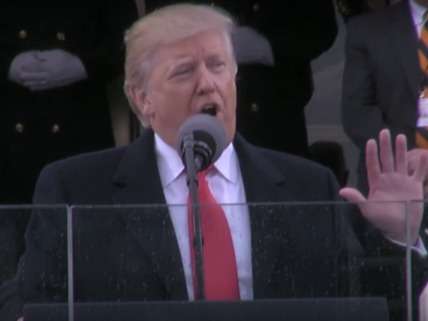Even John Yoo Is Offended by Trump's Broad View of Executive Power
A vigorous advocate of presidential prerogatives says Trump's promises regarding NAFTA, tariffs, and a border wall exceed his authority.

Berkeley law professor John Yoo, who as a Justice Department attorney during George W. Bush's administration became notorious for pushing executive power to alarming extremes, became a critic of presidential presumption during the Obama administration. To his credit, Yoo has not given up that hobby now that the White House has switched parties again. In a recent New York Times op-ed piece, he criticizes Donald Trump for overstepping his constitutional bounds:
Take his order to build a wall along the border with Mexico, and his suggestion that he will tax Mexican imports or currency transfers to pay for it. The president has no constitutional authority over border control, which the Supreme Court has long found rests in the hands of Congress. Under Article I of the Constitution, only Congress can fund the construction of a wall, a fence or even a walking path along the border. And the president cannot slap a tax or tariff on Mexican imports without Congress.
Nor can Mr. Trump pull the United States out of Nafta, because Congress made the deal with Mexico and Canada by statute. Presidents have no authority to cancel tariff and trade laws unilaterally.
Yoo thinks presidents have very wide latitude when they act in the name of national security, a stance that even led him to defend Barack Obama's authority to wage war in Libya without congressional approval. So it is not surprising that Yoo thinks Trump's executive order suspending the admission of refugees and banning travelers from seven overwhelmingly Muslim countries "falls within the law," although it "makes for bad policy." (There is a strong argument that Yoo is right about that.) But Yoo says public statements implying that Trump's order is a Muslim ban by another name made it harder to defend in court:
After the order was issued, his adviser Rudolph Giuliani disclosed that Mr. Trump had initially asked for "a Muslim ban," which would most likely violate the Constitution's protection for freedom of religion or its prohibition on the state establishment of religion, or both—no mean feat. Had Mr. Trump taken advantage of the resources of the executive branch as a whole, not just a few White House advisers, he would not have rushed out an ill-conceived policy made vulnerable to judicial challenge.
Similarly, Yoo concedes Trump's power to remove Acting Attorney General Sally Yates after she refused to defend the immigration order, but he criticizes the administration's complaint that she was "weak on borders and very weak on illegal immigration," on the ground that "such irrelevant ad hominem accusations suggest a misconception of the president's authority of removal."
